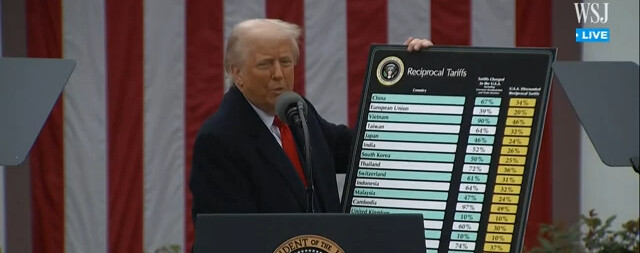There’s so much I could say about the imposition of President Donald Trump’s reciprocal tariffs on countries across the globe that these would not be quick things unless I do my best to make them so.
So I’m going to let others talk.
Not completely, you understand. This is my column, so I’ll at least make comments.
For example, I find it shocking but unsurprising that virtually none of the people currently losing their ever-loving minds over the tariffs will even bother to recognize that they’re reciprocal — and not quite even that.
A perfect example was this dispatch from the whorehouses of Davos, which is what I’ve decided to characterize everything I see from the Economist these days…
Donald Trump has committed the most profound, harmful and unnecessary economic error in the modern era. Almost everything he said—on history, economics and the technicalities of trade—was utterly deluded https://t.co/AU4XjT1mpT pic.twitter.com/2a8G4JP3Et
— The Economist (@TheEconomist) April 3, 2025
What’s so irritating about this is the dishonesty.
As I noted at The Hayride on Thursday, these people can’t possibly believe the things they’re saying…
Nobody seems to recognize, of course, that the tariffs announced by the president are reciprocal, meaning that they’re calibrated to match the negative economic impact of trade policies by other countries which hamper the export of U.S. goods abroad.
Some of those policies are tariffs, and some are trade barriers of other types. Trump’s team has adopted a sliding scale based on the size of our trade imbalance relative to its volume.
And a number of countries — Mexico, Canada, Switzerland, India, Israel, and Vietnam, to name a few — have already signaled that they’re now willing to discuss lowering or eliminating tariffs and trade barriers as a means of escaping Trump’s reciprocal tariffs.
Which, interestingly enough, is the clear aim of the President in instituting those tariffs in the first place.
There’s a colossal disconnect here, which is that these people are screaming about the tariffs and trade barriers Trump is throwing up and yet they don’t acknowledge the tariffs and trade barriers already in place from our trading partners that Trump’s tariffs are a response to.
So Europe’s barriers are good but Trump’s are not?
If they’re both bad, then why isn’t the response from The Economist that “Trump has laid down his marker, and we must have the wise response of creating truly free trade?”
The stunning dishonesty here is what rankles.
Remember that the next time you’re being pestered by the so-called “free trade” crowd who scream about the utter doom that Trump will soon usher in with his Orange Man Bad Smoot-Hawley impression.
And to make this point, I have…
1. John Kennedy (The Live Senator, Not the Dead President)
Here was Kennedy on the floor of the Senate, spending a couple of minutes buttering up the Canadians/Syrupeans before going in for the rhetorical kill on their new prime minister, Mark Carney…
This is the point none of Trump’s critics are willing to make, despite the fact that the abovementioned countries are already moving toward a no-tariff, no-barrier trade regime with the U.S.
Another point which is obvious was made by…
2. Treasury Secretary Scott Bessent
Bessent cautioned foreign countries to chill out rather than try to retaliate, because he warned that we’re prepared to escalate against those trade partners who really want to fight.
Because contra the Eurogeniuses at the Economist, nobody really knows what’s going to come from this.
What isn’t said, and I didn’t see Bessent say it, perhaps because he’s being diplomatic, is that the United States buys 34 percent of the world’s goods despite being less than five percent of its population.
We are not the folks you want to get in a trade war with. The results of angering the American market and the government that regulates that market will inevitably be very bad.
The vast majority of the world either already understands this or will come to understand it very soon. As Bessent notes, for many of our trading partners they’ll barely feel the new tariff number, and a greater spirit of cooperation might make our tariffs even less than they were before Trump’s new regime kicked in.
In an interview with Fox News Tuesday morning (click on the Hayride link above and you’ll find the video for it), Kennedy quipped that rooms at the Hay-Adams Hotel in Washington are going to go at a premium with every country on earth dispatching trade representatives to D.C. in hopes of renegotiating a new relationship with us.
Rather than throwing a fit over the disruption, maybe we should sit back and see what happens.
And of course, there are definitive wins to be had here. One example comes from…
3. Senior White House Counselor for Trade and Manufacturing Peter Navarro
Navarro notes that what this new tariff regime will do – and has already begun to do – is bring auto parts manufacturing back to the United States after long years of our auto industry essentially being a series of assembly plants for foreign parts.
Senior Counselor @RealPNavarro: “Let’s take the auto industry… we’ve essentially been turned into an assembly operation… the end game here for the auto industry is to fill up the half-empty factories that now are operating at low capacitates around Detroit.” pic.twitter.com/x0XRUGStTg
— Rapid Response 47 (@RapidResponse47) April 3, 2025
Obviously, if you had to pick just one piece of the manufacturing chain to host in your jurisdiction, you’d like to be the place from whence the finished goods come. But if what we’re trying to do here is maximize the number of manufacturing jobs we can bring home in industries where the payment of living wages is reasonably possible (like the auto industry, obviously), you want to recapture the car parts manufacturing. Navarro isn’t wrong.
The workers who make those cars certainly don’t think he’s wrong.
Interestingly, though, as you’ll see in a bit, car parts from Mexico and Canada aren’t affected by this. So there isn’t as much disruption afoot, at least in the auto industry, as you might think.
“Oh, but making this stuff in America will drive costs up!” goes the objection.
Well, let’s introduce…
4. Commerce Secretary Howard Lutnick
Lutnick’s CNBC interview Thursday morning was a must-watch if you really want to understand what Team Trump is going for.
The points Lutnick makes in this interview are many, but one I really like is that you’re going to have a big renaissance in design and construction and tooling-up of 21st-century manufacturing plants, which are going to have a whole lot of robots in them.
And robots are interesting, obviously, but perhaps for reasons you haven’t considered.
For one thing, they tend to be more productive and can turn out higher-quality work than, for example, child slaves. Lutnick notes that American manufacturing plants, which are highly automated, might very well outpace those cheap-labor hellholes in China and elsewhere in terms of production costs.
Especially if we’re also turbocharging energy production here.
Yes, but this is for heavy industry like automaking. What about for lighter goods, like the crappy $12 toasters from China you buy at Walmart? Who’s going to fill up a factory with robots to make those, and aren’t you making that $12 Chinese toaster into an $18 toaster, if not a $50 toaster from back home in America?
Well, maybe. Or maybe there’s the fact that once you’ve tooled up a manufacturing plant with AI smart robots, who’s to say what that plant can turn out? Maybe it mostly turns out flat-screen TVs, but once it hits its production quota for those, it might have excess capacity to make toasters, or the really cool toasters which are also air fryers.
We think of a factory as an assembly line for a particular good or set of goods. But that’s a 20th-century mentality. A factory in the 21st century doesn’t necessarily conform to a specific model. Think about a 3D printer, for example — so long as it has the design and the inputs, it can go from making plastic bowls to knives to fidget spinners. It’s a lot easier to make those ho-hum products we’ve accepted are going to be made in China forever than you think, and now there’s a reason to think about making them here again.
Finally, we have…
5. National Economic Council Director Kevin Hassett
Hassett has been killing it on TV this week, and this might have been the best thing he said. He’s talking about the horrific history of this century where trade with China is concerned…
RECLAIMING AMERICAN PROSPERITY
Kevin Hassett: “We were promised prosperity—but instead, we lost jobs, destroyed cities, and hollowed out towns.”@POTUS’s action ends it — we’re making stuff in America again and raising wages. pic.twitter.com/oohCrSLhlO
— Laura Ingraham (@IngrahamAngle) April 3, 2025
No noticeable gain in real income while getting cheap, disposable crap from China, and at what cost?
Something else Hassett noted in a different interview — manufacturing jobs are already cranking up even before all this popped…
National Economic Council Director Kevin Hassett says Trump’s America First trade policy is already bringing jobs back to the U.S.:
“The fact is that people are starting to onshore production here in the U.S., and it’s very visible in the hard data.” pic.twitter.com/oAYpDzGW3L
— Trump War Room (@TrumpWarRoom) April 3, 2025
And Hassett’s interview with Larry Kudlow contained a contention you might not see anywhere, which is that it isn’t necessarily true that these tariffs are inflationary, and onshoring production carries lots of benefits to it…
National Economic Council Director Kevin Hassett: “Last year, auto production in the U.S. dropped 7.8% over the year because of Joe Biden’s policies. Last month, it went up 8.5%. So, we actually more than offset the whole year of Biden’s destructive auto policies.” pic.twitter.com/KZTIKyCeIm
— Rapid Response 47 (@RapidResponse47) March 19, 2025
Are these guys all correct? Hell, who knows?
What we can say, though, is that the people who are screeching about the loss of “free trade” don’t seem to be willing to admit that if it existed at all, there wouldn’t be any actual effect in imposing reciprocal tariffs on anyone — and given that Trump was elected mostly because he carried practically the entire Rust Belt, it’s obviously a major concern that losing the economic activity from manufacturing from the so-called “free trade” we’ve practiced with China and others hasn’t been very fun for Middle America.
Weekly trips to visit the Walmartians notwithstanding.
So no. You don’t know what this is going to result in. It’ll almost certainly be a mixed bag, and it’s just as likely to be a net positive as the reverse.
And if you’re freaking out over what this is doing to your stock portfolio, one of two things is going to be true: either this will work, and the economy will boom, and those stocks you’re holding are going to take off, or it won’t work, it’ll be a political football for Trump that he’ll soon punt, and the market will recover.
Either way, don’t be a sucker. Buy the dip.
READ MORE from Scott McKay:
Coddled Princesses and Stupid-Party Simps Is Not How We Make an American Revival





![Trump's Admin Guts Another ‘Rogue Government Agency with Zero Accountability’ [WATCH]](https://www.right2024.com/wp-content/uploads/2025/03/Trumps-Admin-Guts-Another-‘Rogue-Government-Agency-with-Zero-Accountability-350x250.jpg)



![‘We All Owe Him (Elon) a Huge Debt of Gratitude’ [WATCH]](https://www.right2024.com/wp-content/uploads/2025/03/‘We-All-Owe-Him-Elon-a-Huge-Debt-of-Gratitude-350x250.jpg)

![NCAA Champ Salutes President Trump After ‘BIGGEST UPSET IN COLLEGE WRESTLING HISTORY’ [WATCH]](https://www.right2024.com/wp-content/uploads/2025/03/NCAA-Champ-Salutes-President-Trump-After-‘BIGGEST-UPSET-IN-COLLEGE-350x250.jpg)





